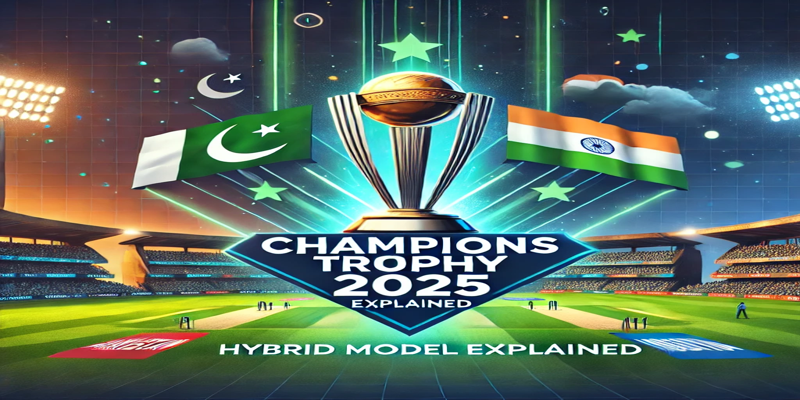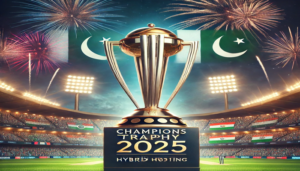
The ICC Champions Trophy 2025 is already shaping up to be one of the most anticipated cricketing events. Scheduled to be held in Pakistan, this tournament will mark a significant milestone as it brings a major ICC event back to the country after more than two decades. However, the road to hosting the Champions Trophy has not been smooth for the Pakistan Cricket Board (PCB). A long-standing controversy involving the Board of Control for Cricket in India (BCCI) and PCB, primarily surrounding the hybrid model, has added complexity to the tournament’s preparations.
What is the Champions Trophy?
The Champions Trophy is one of the International Cricket Council’s (ICC) most prestigious tournaments. Featuring the top eight ODI teams, it is a shorter and more intense version of the ICC Cricket World Cup. The tournament’s format ensures high-quality matches with minimal downtime, making it a fan favorite.
In 2025, Pakistan will host the Champions Trophy, a decision welcomed by cricket enthusiasts in the country. This marks a pivotal moment for Pakistan, as the country has been striving to regain its status as a reliable and safe host for international cricket.

The BCCI-PCB Controversy: An Overview
The BCCI and PCB have had a history of strained relations, primarily due to political tensions between India and Pakistan. The controversy over the Champions Trophy escalated when India raised concerns about sending its team to Pakistan, citing security reasons. This led to a standstill as the BCCI suggested that the tournament should be moved to a neutral venue.
On the other hand, the PCB, under the leadership of its chairman, pushed back firmly. Pakistan argued that if it could successfully host multiple international teams and events, there was no valid reason to question its ability to organize the Champions Trophy. This deadlock brought the hybrid model into the discussion as a potential solution.
What is the Hybrid Model?
The hybrid model is a compromise solution that allows matches to be played in multiple countries rather than a single host nation. In the case of the Champions Trophy 2025, the proposed hybrid model involves hosting Pakistan’s matches in the country while scheduling India’s games or those involving India in a neutral venue, such as the UAE or Sri Lanka. This approach aims to balance both countries’ interests while ensuring the tournament’s success.
Pakistan’s Acceptance of the Hybrid Model
Initially, the PCB was reluctant to accept the hybrid model, as it undermined the country’s efforts to restore its reputation as a safe cricketing destination. However, after extensive negotiations with the ICC and the BCCI, Pakistan agreed to the hybrid model under certain conditions. Let’s explore the key factors and terms that influenced this decision:
1. ICC’s Assurance of Neutrality
The PCB received assurances from the ICC that the hybrid model would not be considered a precedent for future events. This was crucial for Pakistan, as it did not want its hosting rights to be compromised in future tournaments.
2. Financial Compensation
One of the major sticking points was the financial implications of the hybrid model. Pakistan demanded compensation for the revenue loss caused by hosting matches outside the country. The ICC agreed to provide additional financial support to offset these losses, making the model more acceptable to the PCB.
3. Retention of Hosting Rights
The PCB ensured that Pakistan retained its official status as the host of the Champions Trophy 2025. While some matches will be played at neutral venues, the majority of the tournament, including high-profile games, will still take place in Pakistan.
4. Security Assessments
The PCB committed to working closely with the ICC and independent security experts to address any concerns about the safety of players and officials. This included extensive measures to ensure a secure environment for the teams playing in Pakistan.
Implications Of The Hybrid Model
The acceptance of the hybrid model has several implications for cricketing relations and the Champions Trophy itself:
1. Strengthened Pakistan’s Position As A Host
By agreeing to the hybrid model, Pakistan demonstrated its flexibility and commitment to hosting the Champions Trophy. This move is expected to strengthen its position as a credible host for future international tournaments.
2. Set a Precedent for Future Events
The hybrid model could become a template for resolving hosting disputes in politically sensitive regions. However, it also raises concerns about fairness and the long-term implications for countries with strained relations.
3. Continued India-Pakistan Tensions
While the hybrid model resolves the immediate issue, it does not address the underlying political tensions between India and Pakistan. Future ICC events may face similar challenges unless broader diplomatic relations improve.
4. Fan Reactions
Cricket fans in Pakistan have mixed reactions to the hybrid model. While many are excited about the Champions Trophy returning to Pakistan, others feel that hosting matches at neutral venues undermines the significance of the event.

FAQs about Champions Trophy 2025 and the Hybrid Model
1. Why Is The Champions Trophy 2025 Significant For Pakistan?
The Champions Trophy 2025 is a major milestone for Pakistan as it marks the return of a flagship ICC event to the country after more than two decades. It is an opportunity to showcase Pakistan’s ability to host international cricket at the highest level.
2. What Is The Hybrid Model and Why Was It Proposed?
The hybrid model involves hosting matches in multiple countries. It was proposed to address India’s security concerns about playing in Pakistan, allowing matches involving India to be held at a neutral venue.
3. What Conditions Did Pakistan Set For Accepting The Hybrid Model?
Pakistan’s conditions included retaining official hosting rights, financial compensation, and assurances that the hybrid model would not set a precedent for future tournaments.
4. How Will The Hybrid Model Impact The Tournament’s Success?
The hybrid model ensures that the Champions Trophy 2025 proceeds without disruptions. While it addresses political and logistical concerns, it may impact the tournament’s atmosphere and fan experience.
5. What Are The Broader Implications of The BCCI-PCB Controversy?
The controversy highlights the challenges of organizing international sports events in politically sensitive regions. It also underscores the need for the ICC to play a neutral and proactive role in resolving such disputes.
Conclusion
The Champions Trophy 2025 is more than just a cricket tournament for Pakistan; it is a symbol of resilience and progress. While the acceptance of the hybrid model reflects the PCB’s pragmatic approach, it also underscores the complexities of hosting global events in politically sensitive regions. As preparations for the tournament continue, fans eagerly await a thrilling competition that celebrates the spirit of cricket, transcending borders and differences.
You can also read: 5 Steps To Know Importance of Mental Health Counseling?



